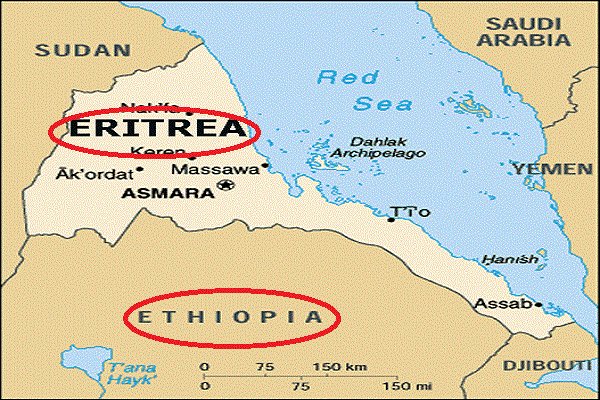In a landmark visit, Ethiopia’s Prime Minister Abiy Ahmed landed in the Eritrean capital, Asmara, on Sunday, for a bilateral summit, aimed at repairing relations between the two countries. Eritrean President Isaias Afwerki warmly greeted Abiy at the airport, Eritrea's state television showed.
The visit comes a month after Abiy surprised people by fully accepting a peace deal that ended a two-year border war between the two countries. The meeting sparkled hope for the halt of one of the most difficult African crises.
Eritrea became independent in 1993 after three years of war, but again the conflict between Asmara and Ethiopia in 1998 arose over disagreement on border delineation, primarily at Badme, and that was the end of diplomatic relations between the two states. However, Eritrea has a permanent delegation in Addis Ababa, representing the African Union.
Then the conflict flared into armed clashes. Although Badme was being administered by Ethiopia, with an MP and an administration, Eritrea said maps clearly showed the territory to be Eritrean and in May sent in troops to occupy the area.
From 1998 to 2000, the border wars claimed some 80,000 lives from both sides, but the Algiers Agreement ended the conflict. However, the president of Eritrea broke international law and triggered the war by invading Ethiopia, abusing the Ethiopian opposition to the verdict on the borders, taking repressive measures such as imprisoning dissidents and refraining from implementing law and adopting strict military rules.
Eritrea, Ethiopia economic interests in resolving the conflicts
Some analysts have argued that, the border conflicts had halted Eritrean affairs over the past 20 years, and all the issues were overshadowed by these clashes. The Ethiopian prime minister took the first step in resolving the conflict in June, announcing that his troops would withdraw from the Badme region and other border areas.
A high-level Eritrean delegation led by Foreign Minister Osman Saleh had earlier visited the Ethiopian capital, Addis Ababa, last month for peace talks, a meeting that was followed by a news conference.
Eritrea and Ethiopia are among the least developed countries in the Horn of Africa. Although the Ethiopian economy has grown significantly in recent years, the Eritrean economy was suffering and had dropped to a record low. Analysts believe that although realization of peace between the two states is in the interest of both, Eritrea's economy will enjoy a greater benefit of the rapprochement.
In addition, the peace talks can attract foreign investors to Eritrea. The end of “state of war” will help Ethiopia solve its problem of not having a sea passage, because after the independence of Eritrea overlooking the Red Sea in 1993, the issue aroused for Ethiopia.
The war between the two countries has caused much difficulty for Ethiopian trade through the ports of Eritrea and the Red Sea, and this peace will help rebuild economic activities to the time prior to conflicts.
At first glance, it seems as if the two countries realized the necessity of bilateral relations, but the fact is there was involvement of foreign countries in the peace talks. Some believe that Washington, an ally of Ethiopia, does not require the country to adhere to the border agreement.
Perhaps the U.S. has come to the conclusion that it is time to make a new alliance as Djibouti, located in the vicinity of Ethiopia and Eritrea, has allowed China to build a military base on its territory. So, given the geopolitical developments in the Red Sea and the Chinese military presence in the United Arab Emirates, America sees its interest in improving relations with Eritrea.
Saudis and Emiratis footprint in African conflicts
In general, the African continent is of great importance to Saudi Arabia and the United Arab Emirates, and these two countries have set their strategic interests on the continent. In many cases, Riyadh and Abu Dhabi have benefited from the support of their African allies in regional conflicts. For example, they have called on African countries, to cut off relations with Iran and Qatar or to engage in military aggression in Yemen in their support.
The poor African states, relying highly on Saudi and Emirati donations, bow down to the two Arab states’ demands. Out of fear of losing alliance and leaving a positive image on the world, Riyadh and Abu Dhabi acted as a mediators in the built up tensions among African states, namely Eritrea and Ethiopia. That would also fulfill their objective of preventing the African states side with Iran or Qatar.
In recent years, Eritrea has improved relations with Saudi Arabia and the UAE has too set up a military base in southern harbor of Eritrea.
Riyadh and Abu Dhabi, both Ethiopia’s allies, played an active role in Ethiopian prime minister’s decision to negotiate with Eritrea with their financial sponsorship.
The unprecedented and controversial trip of Abu Dhabi’s crown prince to Ethiopia last month, in the light of the agreement between the two African states, as they poured in $3 billion was a proof of the UAE push in the two states peace talks.
In any case, it appears that the Arab states of the Persian Gulf and, above all, the UAE and Saudi Arabia are making attempts to establish a new regional system based on which the security of the Persian Gulf region is tied to the security of the Horn of Africa region, and for the same reason strengthening their foothold on the African continent and, in appearance, pursuing peace and reconciliation among its political and economic allies.
MNA/TT

























Your Comment